坦桑尼亚投资法规整理
中亚投资经商法律规定(3篇)

第1篇一、引言中亚地区,包括哈萨克斯坦、吉尔吉斯斯坦、塔吉克斯坦、乌兹别克斯坦和土库曼斯坦五个国家,地处欧亚大陆的心脏地带,拥有丰富的自然资源和广阔的市场潜力。
近年来,随着“一带一路”倡议的深入推进,中亚地区逐渐成为全球投资者关注的焦点。
为了保障投资者的合法权益,中亚各国纷纷制定了一系列投资经商法律规定,本文将对这些法律规定进行梳理和分析。
二、中亚各国投资经商法律规定概述1. 哈萨克斯坦哈萨克斯坦是中亚地区最大的经济体,其投资法律体系较为完善。
哈萨克斯坦的投资法规定了外国投资者在哈萨克斯坦境内投资的权利和义务,主要包括以下内容:(1)投资领域:哈萨克斯坦对外国投资领域没有限制,但在涉及国家安全、公共利益等领域需经过审批。
(2)投资方式:外国投资者可以采取合资、合作、独资等形式在哈萨克斯坦投资。
(3)税收优惠:哈萨克斯坦对外国投资者提供一系列税收优惠政策,如企业所得税减免、关税减免等。
(4)外汇管理:哈萨克斯坦实行外汇自由兑换政策,外国投资者可以自由汇出汇入资金。
2. 吉尔吉斯斯坦吉尔吉斯斯坦投资法规定了外国投资者在吉尔吉斯斯坦的投资权利和义务,主要包括以下内容:(1)投资领域:吉尔吉斯斯坦对外国投资领域没有限制,但在涉及国家安全、公共利益等领域需经过审批。
(2)投资方式:外国投资者可以采取合资、合作、独资等形式在吉尔吉斯斯坦投资。
(3)税收优惠:吉尔吉斯斯坦对外国投资者提供一系列税收优惠政策,如企业所得税减免、关税减免等。
(4)外汇管理:吉尔吉斯斯坦实行外汇自由兑换政策,外国投资者可以自由汇出汇入资金。
3. 塔吉克斯坦塔吉克斯坦投资法规定了外国投资者在塔吉克斯坦的投资权利和义务,主要包括以下内容:(1)投资领域:塔吉克斯坦对外国投资领域没有限制,但在涉及国家安全、公共利益等领域需经过审批。
(2)投资方式:外国投资者可以采取合资、合作、独资等形式在塔吉克斯坦投资。
(3)税收优惠:塔吉克斯坦对外国投资者提供一系列税收优惠政策,如企业所得税减免、关税减免等。
TANZANIA土地政策
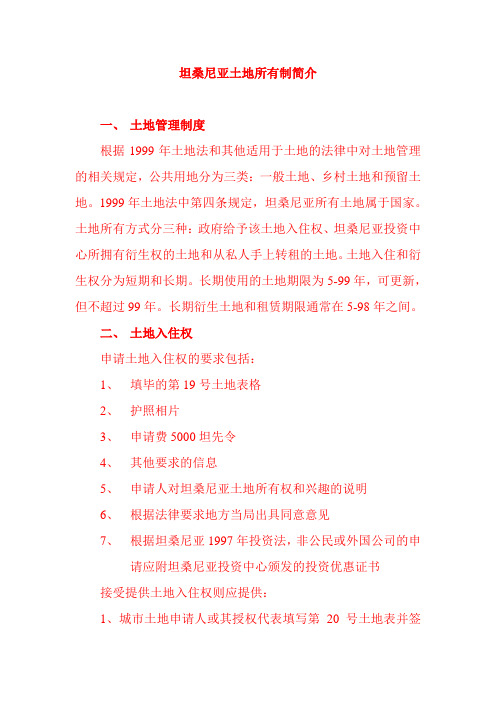
坦桑尼亚土地所有制简介一、土地管理制度根据1999年土地法和其他适用于土地的法律中对土地管理的相关规定,公共用地分为三类:一般土地、乡村土地和预留土地。
1999年土地法中第四条规定,坦桑尼亚所有土地属于国家。
土地所有方式分三种:政府给予该土地入住权、坦桑尼亚投资中心所拥有衍生权的土地和从私人手上转租的土地。
土地入住和衍生权分为短期和长期。
长期使用的土地期限为5-99年,可更新,但不超过99年。
长期衍生土地和租赁期限通常在5-98年之间。
二、土地入住权申请土地入住权的要求包括:1、填毕的第19号土地表格2、护照相片3、申请费5000坦先令4、其他要求的信息5、申请人对坦桑尼亚土地所有权和兴趣的说明6、根据法律要求地方当局出具同意意见7、根据坦桑尼亚1997年投资法,非公民或外国公司的申请应附坦桑尼亚投资中心颁发的投资优惠证书接受提供土地入住权则应提供:1、城市土地申请人或其授权代表填写第20号土地表并签名。
农村用地则填写第21号土地表并签名。
2、缴费5000坦先令使用权证书必须以总统的名义签发,应在第22号土地表中(城市土地)或23号土地表中(农村用地)。
三、公民投资者1999年土地法第19条规定,公民投资者可以通过获取土地使用权、衍生权或者从私人手上转租来获得土地。
四、非公民投资者非公民投资者获得使用权的土地根据1997年坦桑尼亚投资法限用于投资目的。
根据1999年土地法,国外投资者通过以下途径获取土地:1、通过1999年土地法第20条2款获得的衍生土地。
2、通过1999年土地法第25条1-h和1-i款向专员申请土地入住权。
3、从土地私有者手中租赁土地。
4、从政府获取许可证。
5、从其他拥有土地入住权者手中购买土地。
指定用于投资目的的土地应由TIC进行确认、刊载和分配,这样可使投资者获取衍生权。
1999年土地法第19条2款规定非公民可以获得衍生权。
第22条1-ii款允许获得土地衍生权。
如果土地出售给非公民并被用于投资目的,土地入住权可以从一个持有者手中转给另外一个持有者。
基于坦桑尼亚房地产项目的东非投资税务筹划研究

Finance and Accounting Research财会研究 | MODERN BUSINESS 现代商业181基于坦桑尼亚房地产项目的东非投资税务筹划研究段程钟1 吕雪雯21.北京中铁诺德房地产开发有限公司 北京 1001662.珠海横琴闪云付信息科技有限公司 北京 100102摘要:随着“一带一路”倡议的施行,越来越多中国企业走进非洲,在非洲进行基建、地产和制造业投资。
在企业“走出去”的过程中,面对有政治安全风险、经营风险和税务风险,其中税务风险是企业在外经营过程中经常面对的。
本文通过作者在坦桑尼亚的切身工作经历,根据东非三国(肯尼亚、坦桑尼亚、乌干达)的经济法律研究,分析在东非地区税务筹划的关键点,以期能够为中资企业对非投资提供具有建设性的参考建议。
关键词:税收筹划;东非地区;房地产中图分类号:F293.3 文献识别码:A 文章编号:1673-5889(2020)031-0181-02一、坦桑尼亚投资背景分析(一)宏观经济社会环境坦桑尼亚国土面积94.5万平方公里,全国总人口5910万(2018年)。
达累斯萨拉姆是经济与政治中心,工商业繁盛。
坦桑尼亚经济构成中,农业比例最高,对外交流以英语为主,主要流通货币为坦桑尼亚先令和美元。
坦桑尼亚属于一党执政国家,政局稳定。
坦桑尼亚对外企投资,政策上宽松,市场准入门槛较低。
针对坦桑尼亚的房地产市场而言,目前,根据坦桑的国情及政策,坦所有土地均为国家所有。
有资质的个人和企业法人可获得长达99年的法定土地契约以及土地特定部分的占有权。
占有权允许出售、转让和抵押。
近些年来,坦桑政府积极推动当地房地产事业的发展,房屋按揭程序正在逐步完善。
(二)商业法律环境坦桑尼亚的法制环境良好,该国属大陆法系国家,已建立了包括宪法、公司法、土地法、合同法、环境保护法、投资法、劳动法、财政法、税法、外汇法等在内的门类齐全的法律体系,外商的投资权益可得到较完善的法律保护。
试探中国企业对坦桑尼亚投资问题分析
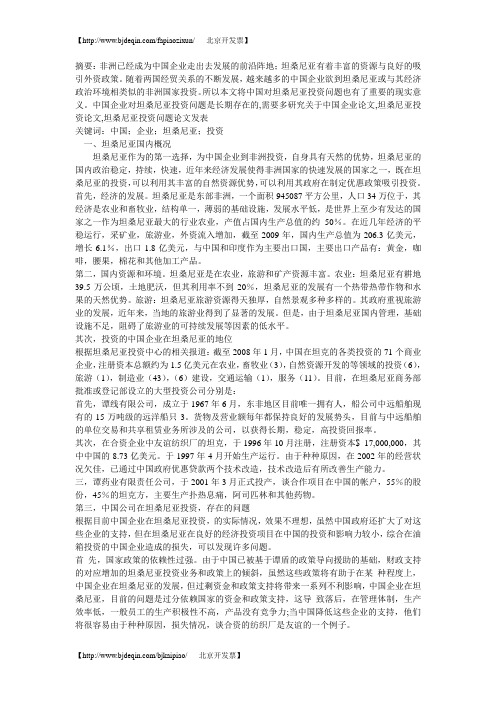
摘要:非洲已经成为中国企业走出去发展的前沿阵地;坦桑尼亚有着丰富的资源与良好的吸引外资政策。
随着两国经贸关系的不断发展,越来越多的中国企业欲到坦桑尼亚或与其经济政治环境相类似的非洲国家投资。
所以本文将中国对坦桑尼亚投资问题也有了重要的现实意义。
中国企业对坦桑尼亚投资问题是长期存在的,需要多研究关于中国企业论文,坦桑尼亚投资论文,坦桑尼亚投资问题论文发表关键词:中国;企业;坦桑尼亚;投资一、坦桑尼亚国内概况坦桑尼亚作为的第一选择,为中国企业到非洲投资,自身具有天然的优势,坦桑尼亚的国内政治稳定,持续,快速,近年来经济发展使得非洲国家的快速发展的国家之一,既在坦桑尼亚的投资,可以利用其丰富的自然资源优势,可以利用其政府在制定优惠政策吸引投资。
首先,经济的发展。
坦桑尼亚是东部非洲,一个面积945087平方公里,人口34万位于,其经济是农业和畜牧业,结构单一,薄弱的基础设施,发展水平低,是世界上至少有发达的国家之一作为坦桑尼亚最大的行业农业,产值占国内生产总值的约50%。
在近几年经济的平稳运行,采矿业,旅游业,外资流入增加,截至2009年,国内生产总值为206.3亿美元,增长6.1%,出口1.8亿美元,与中国和印度作为主要出口国,主要出口产品有:黄金,咖啡,腰果,棉花和其他加工产品。
第二,国内资源和环境。
坦桑尼亚是在农业,旅游和矿产资源丰富。
农业:坦桑尼亚有耕地39.5万公顷,土地肥沃,但其利用率不到20%,坦桑尼亚的发展有一个热带热带作物和水果的天然优势。
旅游:坦桑尼亚旅游资源得天独厚,自然景观多种多样的。
其政府重视旅游业的发展,近年来,当地的旅游业得到了显著的发展。
但是,由于坦桑尼亚国内管理,基础设施不足,阻碍了旅游业的可持续发展等因素的低水平。
其次,投资的中国企业在坦桑尼亚的地位根据坦桑尼亚投资中心的相关报道:截至2008年1月,中国在坦克的各类投资的71个商业企业,注册资本总额约为1.5亿美元在农业,畜牧业(3),自然资源开发的等领域的投资(6),旅游(1),制造业(43),(6)建设,交通运输(1),服务(11)。
坦桑尼亚共和国税务和关税略说2016
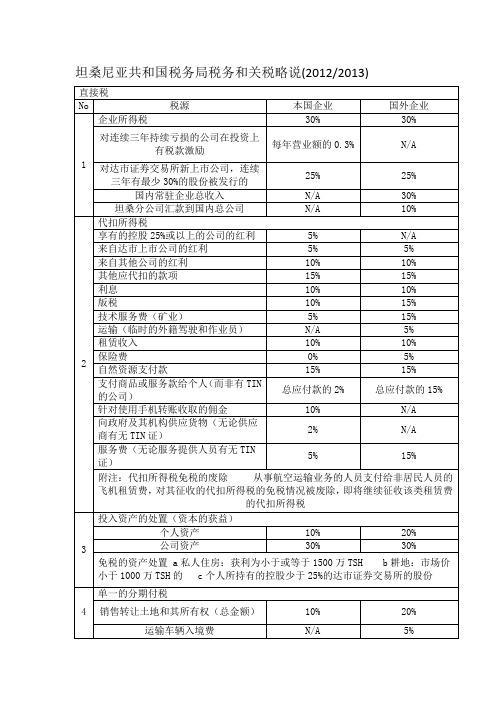
坦桑尼亚铁路有限公司进口的用于铁路的设备和零配件关税被免除
授予使用烷基苯磺酸作为原材料生产肥皂的生产商一年期限的关税豁免,从10%降为0%
使用生物油作为塑料袋的生产商关税被豁免
污水处理厂关税豁免
用于军队的商店组织进口关税被授予一年的豁免
坦桑尼亚国家智能服务进口的物品关税被豁免
60700TSH加上超过54万部分的25%
每月总收入超过72万的
105700TSH加上超过72万部分的30%
以年度收入204万TSH 为上限
附注:1对于本国雇主的外籍雇员的收入应被代扣15%的代扣税,而外籍个人的总收入应被以20%的税率代扣2对于按照教育基金法令第十二章进行捐赠的雇员,此捐赠是可以被减免个人所得税,但是这个减免必须要税务局长审批
国内航班
TSH 10,000
17
港口服务费
居民旅行者
TSH 500
非居民旅行者
USD 5
18
机动车注册
汽车注册费
TSH 150,000
摩托车注册费
TSH 45,000
专用车牌号(三年期限)
TSH5,000,000
年检费
引擎容量
当前费用
新费用
19
1CC—500CC
NiL
NiL
50C—1500CC
每年TSH 100,000
每年TSH 150,000
1500—2500CC
每年TSH 150,000
每年TSH 200,000
2500CC以上的
每年TSH 200,000
每年TSH 250,000
农用拖拉机
免征
20
年度火检费
坦桑尼亚法律规定企业(3篇)
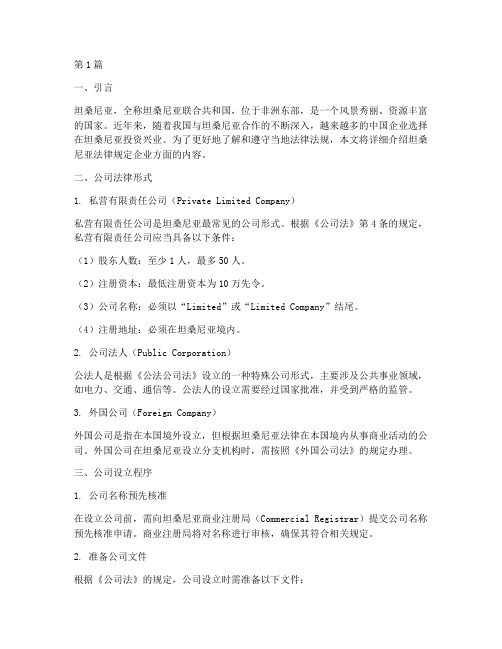
第1篇一、引言坦桑尼亚,全称坦桑尼亚联合共和国,位于非洲东部,是一个风景秀丽、资源丰富的国家。
近年来,随着我国与坦桑尼亚合作的不断深入,越来越多的中国企业选择在坦桑尼亚投资兴业。
为了更好地了解和遵守当地法律法规,本文将详细介绍坦桑尼亚法律规定企业方面的内容。
二、公司法律形式1. 私营有限责任公司(Private Limited Company)私营有限责任公司是坦桑尼亚最常见的公司形式。
根据《公司法》第4条的规定,私营有限责任公司应当具备以下条件:(1)股东人数:至少1人,最多50人。
(2)注册资本:最低注册资本为10万先令。
(3)公司名称:必须以“Limited”或“Limited Company”结尾。
(4)注册地址:必须在坦桑尼亚境内。
2. 公司法人(Public Corporation)公法人是根据《公法公司法》设立的一种特殊公司形式,主要涉及公共事业领域,如电力、交通、通信等。
公法人的设立需要经过国家批准,并受到严格的监管。
3. 外国公司(Foreign Company)外国公司是指在本国境外设立,但根据坦桑尼亚法律在本国境内从事商业活动的公司。
外国公司在坦桑尼亚设立分支机构时,需按照《外国公司法》的规定办理。
三、公司设立程序1. 公司名称预先核准在设立公司前,需向坦桑尼亚商业注册局(Commercial Registrar)提交公司名称预先核准申请。
商业注册局将对名称进行审核,确保其符合相关规定。
2. 准备公司文件根据《公司法》的规定,公司设立时需准备以下文件:(1)公司章程:包括公司名称、注册资本、股东、董事、监事等信息。
(2)股东名册:列明股东姓名、地址、出资比例等。
(3)董事、监事名册:列明董事、监事姓名、地址、职务等信息。
3. 公司注册将上述文件提交给商业注册局进行注册。
注册成功后,公司获得营业执照。
4. 公司税务登记公司设立后,需到税务局进行税务登记,领取税务登记证。
四、公司治理结构1. 股东大会股东大会是公司的最高权力机构,负责决定公司的重大事项。
坦桑尼亚国别税收管理实务
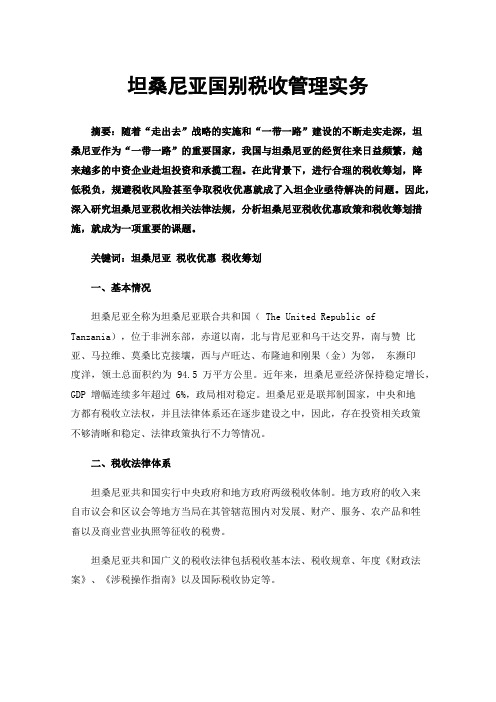
坦桑尼亚国别税收管理实务摘要:随着“走出去”战略的实施和“一带一路”建设的不断走实走深,坦桑尼亚作为“一带一路”的重要国家,我国与坦桑尼亚的经贸往来日益频繁,越来越多的中资企业赴坦投资和承揽工程。
在此背景下,进行合理的税收筹划,降低税负,规避税收风险甚至争取税收优惠就成了入坦企业亟待解决的问题。
因此,深入研究坦桑尼亚税收相关法律法规,分析坦桑尼亚税收优惠政策和税收筹划措施,就成为一项重要的课题。
关键词:坦桑尼亚税收优惠税收筹划一、基本情况坦桑尼亚全称为坦桑尼亚联合共和国( The United Republic of Tanzania),位于非洲东部,赤道以南,北与肯尼亚和乌干达交界,南与赞比亚、马拉维、莫桑比克接壤,西与卢旺达、布隆迪和刚果(金)为邻,东濒印度洋,领土总面积约为 94.5 万平方公里。
近年来,坦桑尼亚经济保持稳定增长,GDP 增幅连续多年超过 6%,政局相对稳定。
坦桑尼亚是联邦制国家,中央和地方都有税收立法权,并且法律体系还在逐步建设之中,因此,存在投资相关政策不够清晰和稳定、法律政策执行不力等情况。
二、税收法律体系坦桑尼亚共和国实行中央政府和地方政府两级税收体制。
地方政府的收入来自市议会和区议会等地方当局在其管辖范围内对发展、财产、服务、农产品和牲畜以及商业营业执照等征收的税费。
坦桑尼亚共和国广义的税收法律包括税收基本法、税收规章、年度《财政法案》、《涉税操作指南》以及国际税收协定等。
基本法:坦桑尼亚制定了《坦桑尼亚法典》,除《增值税法案》《征管法案》外,大部分税收基本法都收录在该法典中。
坦桑尼亚的税收基本法由议会制定和颁布,主要的税收法案包括税收实体法、税收程序法、以及涉外税收法案。
税收实体法包括《所得税法案(2008)》《增值税法案(2014)》《港口服务费法案》《机动车(税务登记和转让)法案》《酒店法案》《航空服务费法案》《道路和燃油税法案》《印花税法案》《税务管理与关税法案》。
在坦桑尼亚承包工程须知
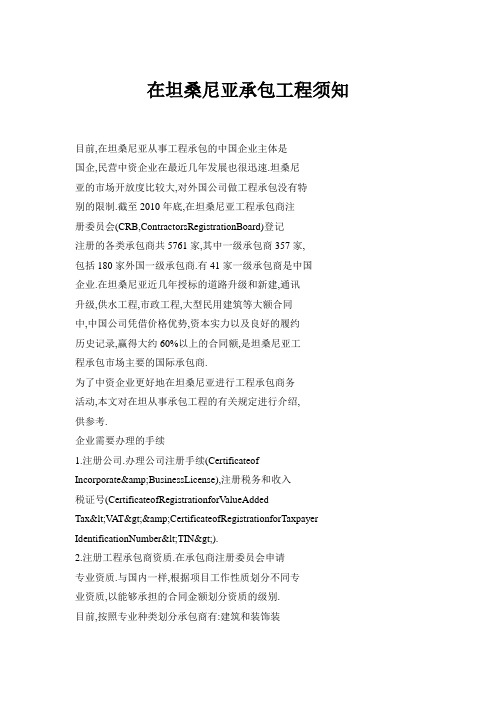
在坦桑尼亚承包工程须知目前,在坦桑尼亚从事工程承包的中国企业主体是国企,民营中资企业在最近几年发展也很迅速.坦桑尼亚的市场开放度比较大,对外国公司做工程承包没有特别的限制.截至2010年底,在坦桑尼亚工程承包商注册委员会(CRB,ContractorsRegistrationBoard)登记注册的各类承包商共5761家,其中一级承包商357家,包括180家外国一级承包商.有41家一级承包商是中国企业.在坦桑尼亚近几年授标的道路升级和新建,通讯升级,供水工程,市政工程,大型民用建筑等大额合同中,中国公司凭借价格优势,资本实力以及良好的履约历史记录,赢得大约60%以上的合同额,是坦桑尼亚工程承包市场主要的国际承包商.为了中资企业更好地在坦桑尼亚进行工程承包商务活动,本文对在坦从事承包工程的有关规定进行介绍,供参考.企业需要办理的手续1.注册公司.办理公司注册手续(CertificateofIncorporate&BusinessLicense),注册税务和收入税证号(CertificateofRegistrationforValueAddedTax<V AT>&CertificateofRegistrationforTaxpayer IdentificationNumber<TIN>).2.注册工程承包商资质.在承包商注册委员会申请专业资质.与国内一样,根据项目工作性质划分不同专业资质,以能够承担的合同金额划分资质的级别.目前,按照专业种类划分承包商有:建筑和装饰装修工程(BuiIding),土木工程(道路,桥梁,地下结构,Civil),机电安装工程(设备安装,mechanica1), Internationajmarket?国际市场在坦桑尼亚承包工程须知文倜泽君电气安装(分高压输送和工业与民用两个资质) (Electrica1)以及特殊专业资质(Specialist—building, Civil,Mechanical,Electrica1).其中特殊专业资质包括:大型拆除,金属结构屋面,防水施工,打井,工程打桩,城市供水与排水及水处理,细木制作加工和安装, 建筑物给排水,铝合金与玻璃工程,水磨石铺贴,高架搭拆,园林绿化,冷藏与空调通风工程,电梯安装,车体组装,电机绕线,通讯安装工程,弱电工程等.每一种类里面按照资质划分成1~7级承包商.独资外国承包商只能申请注册一级资质,合资承包商可以申请一级或者二级,三级及以下资质只颁发给当地承包商.这个规定主要是保护本地企业.3.专业人员注册.按照坦桑尼亚的法律规定,从事于专业工作的外国人都需要到相应专业主管机构注册.注册时要写申请并附加需要的高等教育证书,专业证书,工作经历,推荐信,在坦桑的工作合同和工作许可证等.比如所有工程师都要到工程师注册委员会(ERB,EngineerRegistrationBoard)注册,建筑师和验工师要到建筑师与验工师注册委员会(AQRB,ArchitectandQuantitySurveyorRegistra—tionBoard)~_册,会计师和审计师要到会计师和审计师全国委员会(NBAA,NationalBoardofAccountants andAuditors~注册.从事于专业助理的人员也都需要注册.按照承包商注册委员会规定,公司注册专业资质必须有相应数量注册的专业工程师和技术人员.4.临时注册.如果外国公司是通过国际招标取得在坦桑尼亚施工的项目,开工前外国公司必须到承包商注册委员会申请rl'~a,l-承包商注册,相应人员也须提交文件¨"i25国际市场?Internationalmarket申请MI~Bt-注册.世界上绝大多数国家和地区都对工程建设项目的开工有相应的规定,即项目的业主和承包商必须在项目动工前到规定的主管单位或者部门办理指定的许可批文手续.在中国大家都比较熟悉程序,到了国外对规定不清楚时不要盲目行动,避免不必要的行政罚款或者停工处罚.事先要与业主和咨询沟通好,毕竟他们对本地的程序比较熟悉,了解清楚开工要办理哪些官方规定的手续,然后按照要求走程序.开工需办理的法定手续1.签订合同后,在项目的动员期间,承包商须向业主或者咨询申请查看建设施工许~T(BuildingPermit),并索取复印件存档以备官方检查.这个批文申请基本上都是由业主委托建筑师办公室办理的.2.承包商接收工地后,在城市施工需要办理临时施工围挡许~$JT_(HoardingPermit).拿到围挡许可证后需要核实许可证的有效时间,一般是一年,在期满前要去补缴延长许可时间的费用.3.因为施工需要临时占用公共使用空间即交通通道,人行道或城市绿化土地,需要到市(区)政府办理临时占道许~(TemporaryOccupancyCertificate),许可证有时间限制,期满后必须重新申请.承包商按照要求提交临时占用申请,附上合同复印件,施工许可证,现场平面图,计划占道和周边相邻物平面尺寸图.4.到承包商注册委员会办理项目登记.缴费登记后取得施工牌标签(CRBSticker);~u事故登记本(Accidents RegisterBook).登记费用根据合同总金额的大小不同. 5.到建筑师与验工师注册委员会办理登记,这是需要咨询方的建筑师和验工师出具其公司和个人资质证书和申请办理.咨询缴费后取得施工牌标签(AQRBSticker)和建筑师现场指令本(Architect'SSite InstructionsBook).6.到工程师注册委员会办理登记.办理时需要咨询方的工程师出具公司和个人资质,缴费后取得施工牌标签(ERBSticker)和工程师现场指令本(EngineerSSite InstructionsBook);承包商需要出具现场工程师的个人注册资质办理注册.7.到市(区)政府工程师办公室办理开工许可证26¨《(CornmencementCertificate),同时办理政府工程师(相当于国内的质检站)过程监督检查表格(City/Municipal EngineerInspectionForm)登记.8.到职业健康与安全部门(OccupationalHealthand SafetyAuthority)办理工作场所的登记证书(Certificate ofRegistrationofFactory/Workplace)和合规许可证(ComplianceLicense),其中登记证书的有效期是一年,到期后需要更新.在这个部门每年还需要办理项目人员健康体检bT(MedicatExaminationCertificate).健康证是按照日历年检查一次.现场发生的重大安全事故都要上报给该部门.9.临时供电,供水和排污连接.接收现场,确定施工的平面布置后,需要和当地的供电部门联系,申请项目施工用电连接;和当地的市政供水和排污公司联系, 申请施工用水连接和临时生活排污进入污水管网系统.10.如果项目上有外国人,还需到移民局申请居住证(ResidencePermit)go劳工部申请工作许~t(Working Permit).对于当地人,还要按照劳工法办理缴纳社保和其他费用.工程承包合同格式1.PPRA合同格式,2006年版.PPRA是公共采购管理局(PublicProcurementRegulatoryAuthority)的缩写.该机构负责制定官方或者半官方的采购管理条例, 监督采购执行和仲裁采购过程中发生的争议,纠纷. 2.NCC合同格式.NCC是国家建设委员会(NationalConstructionCouncil)的缩写.目前坦桑尼亚施工行业的价格指数,合同仲裁由该机构管理.3.FlDIC合同格式,目前绝大部分项目采用的是1999年版本.其中有采用业主设计和承包商施工的红皮书《ConditionsofContractforConstruction》,也有采用由承包商设计和施工的黄皮书《Conditionsof ContractforPlantandDesign—Build》.4.其他双方约定的合同格式.如,由国际机构,外国政府出资援建的项目,就要按照出资机构规定的格式;外来投资者在坦桑尼亚的投资项目,由投资者与承包商约定合同格式和内容.目前在坦桑尼亚实行的EPC或者交钥匙项目合同形式基本上只限于设备采购合同.镱;。
中华人民共和国政府和土耳其共和国政府关于相互促进和保护投资协定
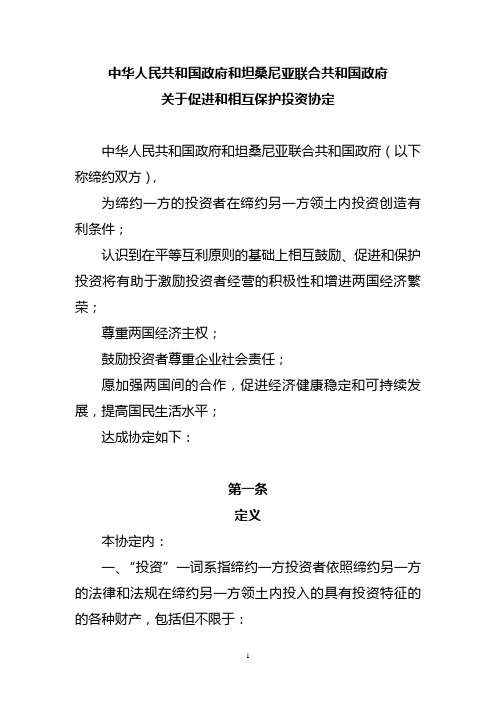
中华人民共和国政府和坦桑尼亚联合共和国政府关于促进和相互保护投资协定中华人民共和国政府和坦桑尼亚联合共和国政府(以下称缔约双方),为缔约一方的投资者在缔约另一方领土内投资创造有利条件;认识到在平等互利原则的基础上相互鼓励、促进和保护投资将有助于激励投资者经营的积极性和增进两国经济繁荣;尊重两国经济主权;鼓励投资者尊重企业社会责任;愿加强两国间的合作,促进经济健康稳定和可持续发展,提高国民生活水平;达成协定如下:第一条定义本协定内:一、“投资”一词系指缔约一方投资者依照缔约另一方的法律和法规在缔约另一方领土内投入的具有投资特征的的各种财产,包括但不限于:(一)动产、不动产及抵押、质押等其他财产权利及类似权利;(二)公司的股份、债券、股票或其他形式的参股;(三)金钱请求权或任何其他与投资相关的具有经济价值的履行请求权;(四)知识产权,特别是著作权、专利、商标、商号、工艺流程、专有技术和商誉;(五)法律或法律允许依合同授予的商业特许权,包括勘探、耕作、提炼或开发自然资源的特许权;(六)包括政府发行的债券在内的债券、信用债券、贷款及其他形式的债以及由此衍生出的权利;(七)合同权利,包括交钥匙工程合同、建设合同、管理合同、生产合同和收入共享合同。
投资特征系指资本或其他资源的投入、对收益或利润的期待或者对风险的承担。
作为投资的财产发生任何符合投资所在的缔约方的法律法规的形式上的变化,不影响其作为投资的性质。
缔约一方投资者通过其全部或部分拥有的,住所在缔约另一方领土内的企业所作出的投资也应视为本款定义的投资。
为进一步明确,本条第一款第(三)项的金钱请求权不包括:(一)仅源于缔约一方领土内的国民或企业向缔约另一方领土内的企业销售货物或提供服务的商业合同的金钱请求权;或者(二)因婚姻、继承等原因产生的不具有投资性质的金钱请求权。
原始到期期限为3年以下的债券、信用债券和贷款不视为本协定项下的投资。
二、“投资者”一词,系指在缔约另一方领土内正在投资或已经投资的缔约一方的国民或者企业:(一)“国民”一词,系指根据缔约任何一方可适用的法律拥有其国籍的自然人。
坦桑尼亚投资法案1997
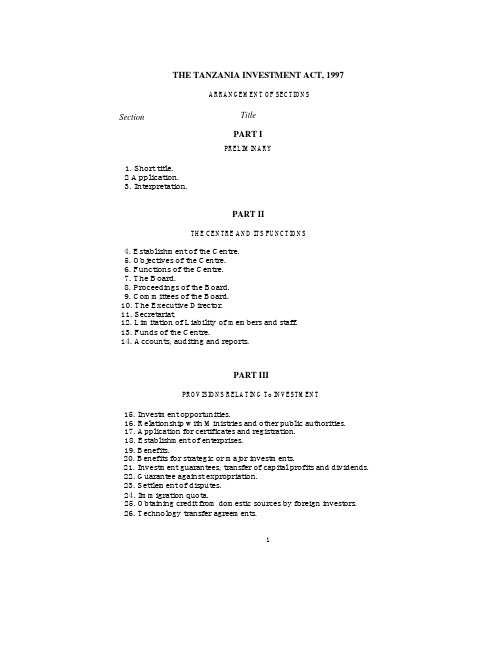
THE TANZANIA INVESTMENT ACT, 1997ARRANGEMENT OF SECTIONSTitleSectionPART IPRELIMINARY1. Short title.2 Application.3. Interpretation.PART IITHE CENTRE AND ITS FUNCTIONS4. Establishment of the Centre.5. Objectives of the Centre.6. Functions of the Centre.7. The Board.8. Proceedings of the Board.9. Committees of the Board.10. The Executive Director.11. Secretariat.12. Limitation of Liability of members and staff.13. Funds of the Centre.14. Accounts, auditing and reports.PART IIIPROVISIONS RELATING To INVESTMENT15. Investment opportunities.16. Relationship with Ministries and other public authorities.17. Application for certificates and registration.18. Establishment of enterprises.19. Benefits.20. Benefits for strategic or major investments.21. Investment guarantees, transfer of capital profits and dividends.22. Guarantee against expropriation.23. Settlement of disputes.24. Immigration quota.25. Obtaining credit from domestic sources by foreign investors.26. Technology transfer agreements.12 No. 26Tanzania Investment1997PART IVGENERAL PROVISIONS27. Offences and penalties.28. Service of documents.29. Regulations.30. Repeals.31. Transitional provisions.1997Tanzania Investment4 No. 26(b) if locally owned, the minimum investment capital is not less thanTanzania shillings equivalent of US dollars one hundred thousand(US$100,000).(3) Notwithstanding the provisions of subsection (1)(a) and (b), theprovisions of Section 21 which relates to guarantees of transfer of capital,profits and dividends and Section 22 which relates to the guaranteesagainst expropriation, shall apply to any business enterprise which holdsa mineral right granted under the Mining Act, 1979, or a licence grantedunder the Petroleum (Exploration and Production) Act, 1980, as thoughthe holder has for the purpose of those provisions been granted a certifi-cate of incentives and protection.(4) Nothing in Section 22 relating to expropriation shall be read orconstrued as limiting or qualifying the right of the Minister or the Com-missioner acting under and in accordance with the Petroleum (Explora-tion and Production) Act, 1980 or the Mining Act, 1979, to terminatea licence granted under those laws.(5) Notwithstanding subsection (1), the Centre shall assist all inves-tors, whether or not this Act applies to them to obtain necessary permits,authorizations, approvals, registrations, consents, licences and any othermatter required by law for a person to set up and operate investment.3. In this Act, unless the context requires otherwise-Interpre-tation''Board'' means the Board of Directors of the Centre appointed undersection 7;''benefits'' includes facilities and incentives provided by or pursuant tothis Act;''business enterprise'' means any industry, project, undertaking or bus-iness to which this Act applies or an expansion, restructuring, rehabili-tation or technical improvement of the industry, project, undertakingor business or any part of the business, provided that the businessenterprise is profit motivated and operated on commercial principles;"capital'' means all cash contribution, plant, machinery, equipment,buildings, spare parts, and other business assets other than goodwillwhich are not consumed in the regular operations of the business andhave a life of more than twelve months;''Centre'' means the Tanzania Investment Centre established by section4;"certificate'' means the certificate of incentives issued under section17(l);"facilities'' include licences, approvals and permits necessary for theestablishment of a business enterprise which an investor may be ob-liged to obtain for the purposes of this Act;No. 26Tanzania Investment1997 5 ''foreign capital'' rneans convertible currency, plant, machinery, equip-ment, spare parts, raw materials and other business assets other thangoodwill that enters Tanzania with no initial disbursement of foreignexchange and are intended for the production of goods and servicesrelated to an enterprise to which this Act applies;"foreign investor'' in the case of a natural person means a person whois not a citizen of Tanzania, and in the case of a company, a companyincorporated under the laws of any country other than Tanzania inwhich more than fifty percent of the shares are held by a person whois not it citizen of Tanzania, and in the case of partnerships, means apartnership in which the partnership controlling interest is owned bya person who is not a citizen of Tanzania;"foreign loan'' means a loan obtained from outside Tanzania denomi-nated in any currency other than the Tanzanian currency;''incentives'' means tax reliefs and concessional tax rates which maybe Acts Nos33 of 1973 accessed by an investor under the Income Tax Act, 1973, the CustomsTariff Act, 1976, the Sales Tax Act, 1976 and any other law for the12 of 197613 of 1976 time being in force, and includes additional benefits that may beaccessed by an investor under sections 19 and 20;"investment'' means the creation or acquisition of new business assetsand includes the expansion, restructuring or rehabilitation of an exist-ing business enterprise;''local investor'' means a natural person who is a citizen of Tanzania; aCompany incorporated under the laws of Tanzania in which the major-ity of the shares are held by a person who is a citizen of Tanzania,or a partnership in which the partnership controlling interest is ownedby a person who is a citizen of Tanzania;"member'' means a member of the Board of the Centre:"Minister'' means the Minister responsible for investrnents;''technology transfer agreement'' means an agreement relating to anenterprise to which this Act applied; that involves-(i) the assignment. sale or use of foreign patents. copyrights,trademarks or other industrial property rights;(ii) the supply of foreign technical know-how or technologicalknowledge;(iii) foreign technical assistance, design and engineering, consul-tancy or other technical services in any form they may besupplied;(iv) foreign managerial, marketing or other services,except that an agreement shall not be regarded as a technology transfer agreement for the purposes of this Act if its duration does not exceeda period of eighteen months.Tanzania Investment 19976 No. 26PART II THE CENTRE AND ITS FUNCTIONS 4.-(1) There is hereby established a body to be known as the Tan-zania Investment Centre.Establish-ment of the centre(2) The Centre shall be an Agency of the Government and shall be under the general supervision of the Minister.(3) The Centre shall be a body corporate with perpetual succession and a common seal and, shall in its own name be capable of-(a) acquiring and holding movable and immovable property, to dis-pose of property and to enter into any contract or other transact-tion;(b) suing and being sued; and (c) doing and suffering all other acts and things which bodies corpo-rate may lawfully do or suffer, for the proper performance of its .functions under this Act.5. The Centre, which shall be a one-stop centre for investors shall be the primary agency of Government to co-ordinate, encourage, promote and facilitate investment in Tanzania and to advise the Government on investment policy and related matters.Objec-tives of centre6. For the purpose of section 5, the Centre shall-(a) initiate and support measures that will enhance the investmentclimate in the country for both local and foreign investors;Functionsof centre (b) collect, collate, analyse and disseminate information about invest-ment opportunities and sources of investment capital, and adviseinvestors upon request on the availability, choice or suitabilityof partners in joint-venture projects;(c) in consultation with Government institutions and agencies iden-tify investment sites, estates, or land together with associated facilities of any sites, estates or land for the purposes of investors and investments in general-(d) assist all investors. including those who are not bound by the provisions of this Act, to obtain all necessary permits, licencesapprovals consents. authorizations, registrations and other mat-ters required by law for a person to set up and operate an invest-ment; and to enable certificates issued by the Centre to have fulleffect.(e) provide, develop, construct, alter, adapt, maintain and administerinvestment sites, estates or land together with associated facilitiesof those sites, estates, land and subject to relevant law, the cre-ation and management of export processing zones.1997 7Tanzania InvestmentNo. 26(f) provide and disseminate up-to-date information on benefits orincentives available to investors;(g) carry out and support local investment promotion activities whichare necessary to encourage and facilitate increased local invest-ments, including entrepreneurial development programmes;(h) perform any other functions which are incidental to the attain-ment of the objectives of this Act.The7.-(1) There is hereby established a Board of the Centre which shall Board be responsible for the discharge of the functions of the Centre.(2) The Board shall consist of-(a) a Chairman who shall be appointed by the President;(b) two members appointed by the Minister from the private sector;(c) two members appointed by the Minister from the public sector;and(d) two other members appointed by the Minister.(3) The Minister shall in appointing members pursuant to subsection(2), ensure that he appoints only persons with sound knowledge and experience in public or private sector investment and management issues.(4) The Executive Director shall be the Secretary of the Board.(5) A member of the Board shall hold office for a term of three yearsand shall be eligible for re-appointment.(6) A member of the Board appointed by the Minister may in writing addressed to the Minister resign his office.(7) Members of the Board shall be paid such allowances as the Minis-ter shall determine.(8) The Board shall ordinarily meet once every three months andmay meet in extraordinary session whenever necessary.8. Subject to the provisions of this Act, the Board shall determine its own procedure for convening and conducting its meetings.9. The Board may, for the discharge of the functions of the Centre, appoint Committees of the Board comprising of members of the Board or non-members or both and may assign to them any function which the Board may determine.10. There shall be an Executive Director of the Centre who shall be iointed by the President upon recommendation by the Minister to serve-(a) for a term of five years and may be reappointed for a furthernon-renewable term of five years;(b) on any other terms and conditions specified in the instrument ofhis appointment or as the Board may determine.Proceed-ings of Board commit. tees of the Board The Executive Director8 No. 26Tanzania Investment 199711.-(l) There shall be a Secretariat of the Centre which shall consist of the Executive Director and other officers and staff of the Centre.Sec-retariat(2) There shall be established in the Centre any number of divisions,departments or zonal offices with such number and category of officers and staff as the Board may determine.(3) The officers and staff of the Centre shall be appointed by the Board as may be required for the performance of the functions of the Secretariat of the Centre.(4) The Board may delegate some of its powers under sub-section (3) to the Secretariat for the appointment of staff at any levels which it may determine.(5) The officers and staff of the Centre shall be paid remuneration or allowances which the Board may determine.(6) Subject to any general directions which the Board may give, the Executive Director shall be responsible for the day-to-day adminis-tration of the Centre and the implementation of the decisions of the Board.(7) Subject to this Act, the employees of the Investment Promotion Centre (IPC) established under the National Investment (Promotion and Protection) Act, .1990, who are immediately before the coming into operation of this Act employed by the IPC, with effect from the coming into operation of this Act, be transferred to and be employed by the Centre.12. A member, officer or other staff of the .Centre shall or in his personal capacity be liable in civil or criminal proceedings, in respect of any act or omission done in good faith in the exercise of his functions under this Act.Limita-tion of Iia-bility of members13.-(1) The funds available for the purpose of enabling the Centre to perform its functions under this Act shall consist of-Funds oftheCentre (a) money from time to time appropriated by Parliament for thatpurpose;(b) fees and charges levied under subsection (3) for the supply ofgoods and services to investors and other interested parties in relation to its functions under this Act;(c) any other monies received by or made available to the Centrefor the purpose of performing its functions under this Act.(2) Without prejudice to the generality of the financial provisionsunder this Act, the Centre shall establish a General Fund into which all money received by it shall be paid and out of which all payments required to be made by the Centre shall be effected.1997 9 No. 26Tanzania Investment(3) The Centre may. in the discharge of its functions and in accordancewith the terms and conditions on which the funds may have been obtainedand derived, charge the general Fund all remunerations, allowances, salaries, fees. pension fund contributions, gratuities, working expensesor other charges properly arising including any approved capital expen-diture.(4) The Centre shall, not later than three months before the end ofeach financial year. prepare and submit to the Board for its approvalestimate of income and expenditure of the Centre for the next ensuingyear and mat, at any time before the end of it financial year, prepareand submit to the Board for approval any estimates supplementary tothe estimates of a current year.(5) Subject to any other direction of the Board no expenditure shallbe made out of funds of the Centre unless that expenditure is part of'the expenditure approved by the Board under the estimates for thefinancial year in which that expenditure is to be made or in the estimates supplementary to it.(6) The Centre may, with the approval of the Board, invest as itconsiders fit any monies not required for immediate use.14.-(I) The financial year of the Centre shall be the same as the financial year of the Government.(2) 'The accounts of the Centre shall be prepared in accordance with approved accounting standards and shall be audited by the Controller and Auditor General within three months after the close of the financial year.(3) As soon as the accounts of the Centre have been audited and in any case not later than four months after the close of the financial year, the Board shall submit to the Minister a copy of the audited statements of accounts together with a copy of the report, made by the auditor on the statement of accounts.(4) The Centre shall, within five months after the close of the financial year, cause to he prepared and submitted to the Minister a report dealing generally with the activities and operation of the Centre during that year and accompanied by-(a) a copy of the audited accounts of the Centre;(b) a copy of the auditors report on the accounts; and(c) any other information which the Minister may direct.(5) The Minister shall within not more than three months, after receiv-ing the accounts and reports, lay them before the National Assembly.Accounts, auditing and re-ports199710 No. 26Tanzania InvestmentPART IIIPROVISIONS RELATING TO INVESTMENT 15. The Centre shall, in liaison with relevant Ministries and other authorities, determine investment opportunities available in the country and the modalities of accessing them.16.-(I) For the purposes of making the Centre an effective one stop Centre, all Government departments, Government agencies and other public authorities shall co-operate fully with the Centre in the perfor-mance of its functions under this Act.Relation-ship with Ministriesand otherpublic au-(2) Notwithstanding the generality of sub-section (1), where licences or approvals are required by an investor, the Centre shall liaise in writing with the relevant authorities to secure the necessary licences and approv-als as required by the investor.thorities(3) The relevant authority which receives the request under sub-sec-tion (2) shall within fourteen working days of receipt of the request,issue the required licence or approval or serve a written objection to the Centre.(4) Where the Centre does not receive a written objection from the relevant authority within the specified time under sub-section (3) the necessary licence or approval shall be deemed to have been granted.(5) Where the Centre receives any written objection from the relevant authority within the specified time under sub-section (3), it shall, where it does not agree with the objection, communicate the objection, within seven days of its receipt, together with its own recommendation to the Minister for his decision.(6) The Minister shall within seven days of receipt of the objection,and the Centre's recommendation, notify the Centre and the relevant authority of his decision and the Centre shall immediately communicate that decision to the investor.(7) Any person aggrieved by the decision made pursuant to the pro-vision of subsection (5) and (6), may appeal to the Minister.(8) The Minister may, on the advice of the Board in writing request the relevant Minister to station at the offices of the Centre any public officers who may be specified and that request shall be complied with.17.--(I) All applications for certificates of incentives and protection under this Act, shall be made to the Centre and the Centre shall, issue Applica-tion for certifi-certificates in accordance with the provisions of this section.cates and(2) Where an application is for new investment, it. shall contain-registra-(a) the name and address for the proposed business enterprise, itstion legal form, its bankers, the name and address of each director or partner and the name, address, nationality and shareholding,of each share holder;Invest-ment op-por-tunities1997 11Tanzania InvestmentNo. 26(b) the qualifications, experience and other relevant particulars ofthe project management;(c) the nature of the proposed business activity and the proposedlocation where that activity is to be carried on;(d) the proposed capital structure or the amount of investment andthe projected growth over the next five years;(e) how the investment will be financed;(f) evidence of sufficient capital available for investment;(g) an undertaking that the project shall be implemented as indicatedin the projections of the project.(3) Where an application is to rehabilitate or expand an existing en-terprise or both, it shall contain:(a) the name of the existing enterprise, its Articles of Associationand Memorandum of Association or partnership agreement;(b) the qualifications of the project management;(c) a statement of audited accounts for the three previous years;(d) the nature of rehabilitation or expansion,,(e) the capital structure and projected growth over the next five years;(f) financing of the rehabilitation or expansion project, together withevidence of availability of finances;(g) an undertaking that the expansion or rehabilitation shall be im-plemented as indicated in the projection.(4) Where the application is for equity investment, shares or stockin an enterprise, it shall contain-(a) the name of the enterprise in which the equity investment is madeor the shares held;(b) constitution of the enterprise or partnership agreement;(c) the amount of equity investment made;(d) the number of shares or stock held by the equity investor, and(e) the currency in which the equity investment is made.(5) The Board shall determine the procedure of application, and themanner in which certificates of incentive shall be issued and registeredand shall cause that determination to be known to the potential investorand the public in general.(6) The Board shall cause to be maintained a register of all certifiedbusiness enterprises containing such particulars as the Board may deter-mine.(7) A certificate of incentives shall not be transferred, or assigned oramended without the approval of the Centre.(8) Where a holder of a certificate does not commence operationswithin the first two years of issuance of a certificate without satisfactory reasons, the centre may, subject to the rights of innocent third parties,declare anything done or any benefit obtained under the certificateto be void and notify the holder of the certificate accordingly.12 NO. 26Tanzania Investment 1997(9) Where the holder of a certificate ceases, for any reason to operate the investment to which the certificate relates, he shall notify the Centre in writing and he shall be entitled to all rights and be liable to all obligations incured under this Act up to the date he ceased to operate and on that date his certificate shall be deemed to have expired.(10) A holder of a certificate shall inform the Centre in writing of the date of commencement of investment and the Centre shall forthwith verify the commencement of operations.(I 1) A holder of a certificate shall inform the Centre in writing when-(a) a person other than the person to whom the certificate was issuedhas succeeded to the investment;(b) the name or description of the business or enterprise is changed;or (c) there is an enlargement of or substantial variation in the invest-ment.(12) Notwithstanding the provisions of subsection (7), a person other than the holder of a certificate who is affected by or is interested in a change or variation under subsection (8), may so inform the Centre if the holder of a certificate fails to inform the Centre within a reasonable time(13) Where the Centre is satisfied that. a change or variation has occured as provided in subsection (8) in respect of a certificate issued under this Act, the Centre shall amend the certificate to take into account the change or variation.18.-(1) The Centre shall co-ordinate the establishment of business enterprise to which this Act applies including-(a) incorporation or registration of business enterprises under the Companies Ordinance or under any other laws which are relevant to the establishment of enterprises;Cap. 212(b) the filling of Value Added Tax Forms;(c) the filling of investment Registration Forms as the Centre may from time to time prescribe;(d) facilitating the obtaining by investors of the necessary licences,approvals, facilities or services;(e) the filling of Immigration Forms.(2) On submission of an application for the incorporation or registra-tion of an enterprise under subsection (1) of this section, the officers responsible for the incorporation and registration shall, where the docu-ments of the applicant are in order, complete the processing of the,application and issue the requisite certificate to the applicant within a period not exceeding fourteen working days from the date of the submi-sion of the application.19---G) A business enterprise in respect of which a certificate is granted under this Act shall be entitled to the benefits which are applic-able to that enterprise under the provisions of the Income Tax Act,1973, the Customs Tariff Act 1976, the Sales Tax Act, 1976, or of any other written law for the time being in force.Benefits,Act No.33 of 197312 of 197613 of 1976Establish-ment ofenter-prisesTanzania Investment(2) For the purposes of creating a predictable investment climate, the benefits referred to under sub-section (1) shall not be amended or mod-ified to the detriment of the investors enjoying those benefits.20.-(I) For the purposes of promoting identified strategic or major investments, the Minister, may, by order published in the Gazette, and after consultation with appropriate government authorities and after consultation with the Minister of Finance, specify specific in addition to the benefis provided under section 19 of this Act for any period which the Board may specify.Benefits for strategic or major invest-ments(2) Where the Ministers do not agree on any issue or matter in accor-dance with the provisions subsection (1); the Minister shall within onemonth from the date of the consultations referred to in subsection (1),submit the matter to the President for consideration.21. Subject to this section, a business enterprise to which this Actapplies shall be guaranteed unconditional transferability 'through any authorised dealer bank in freely convertible currency of-(a) net profits or dividends attributable to the investment;(b) payments in respect of loan servicing where a foreign loan hasbeen obtained(c) royalties, fees and charges in respect of any technology transferagreement registered under this Act;(d) the remittance of proceeds (net of all taxes and other obligations)in the event of sale or liquidation of the business enterprise orany interest attributable to the investment;(e) payments of emoluments and other benefits to foreign personnelemployed in Tanzania in connection with the business enterprise.22.-(l) Subject to subsection (2) and (3) of this section-Guaran-tee (a) no business enterprise shall be nationalised or expropriated byagainst the Government, and expropri-(b) no person who owns, whether wholly or in part, the capital of ationany business enterprise shall be compelled by law to cede hisinterest in the capital to any other person.(2) There shall not be any acquisition, whether wholly or in part ofa business enterprise to which this Act applies by the State unless the acquisition is under the due process of law which makes provision for-(a) payment of fair, adequate and prompt compensation, and(b) a right of access to the Court or a right to arbitration for thedetermination of the investor's interest or right and the amountof compensation to which he is entitled.(3) Any compensation payable under this section shall be paidpromptly and authorisation for its repatriation in convertible currency,where applicable, shall be issued.23.--(l) Where a dispute arises between a foreign investor and the Centre or the Government in respect of a business enterprise, all efforts shall be made to settle the dispute through negotiations for an amicable settlement.Settle-ment of disputes 1997 13No. 26Investmentquaran-tees,transfer ofcapital,profits。
坦桑尼亚矿业及税收管理新政策分析

最大范围 /km2
初始有效期 /a
延续期
申请费 /美元 准备金 /美元 年租金 /(美元 /km2)
200
探矿 (金属矿产和能源矿产)
4
许可证
可延续 2次,初始为 4a:第 1次可延续 3a,第 2次可 延续 2a;每次延续强制性 300(初次申请), 收回许可证面积 50%;小 300(每次延续)
关键词 坦桑尼亚 矿业 税收 政策 DOI:10.3969/j.issn.16746082.2019.05.004
坦桑尼亚联合共和国位于非洲东部、赤道以南, 由坦噶尼喀(Tanganika)大陆和桑给巴尔(Zanzibar) 岛及 20多个小岛组成,国土总面积为 94.5万 km2, 其中桑给巴尔岛面积 2657km2,为第一大岛。坦桑 尼亚联合共和国由坦噶尼喀大陆和桑给巴尔岛于 1964年 4月合并组成,并于 1974年 4月制定了联合 共和国宪法,并进行了多次修改,联合共和国宪法规 定联合共和国分设联合政府和桑给巴尔地方政府, 桑给巴尔政府是联合共和国的重要组成部分,其总 统为联合共和国内阁的重要组成,有权处理除宪法 规定的 22项联合事务之外的桑给巴尔事务。由于 桑给巴尔岛为坦桑尼亚重要的旅游岛屿,其矿业开 发极为受限,因此本文的税收和矿业政策,除非特别 指明外,均适用于坦噶尼喀大陆区域。
时未能满足开发需要时,可申请保留许可证,期限不 超过 5a,可申请延续 1次,期限不超 5a[34]。 1.3 矿业权费用
进行矿产勘查和开采,期限为 1a,可以申请多次延
坦桑尼亚矿业权的主要费用包括申请费、准备
期,直到无开采能力为止。
金和年费,其标准费用见表 1。
表 1 坦桑尼亚矿业权费用一览表
许可证类型
SerialNo.601 May.2019
坦桑尼亚投资法
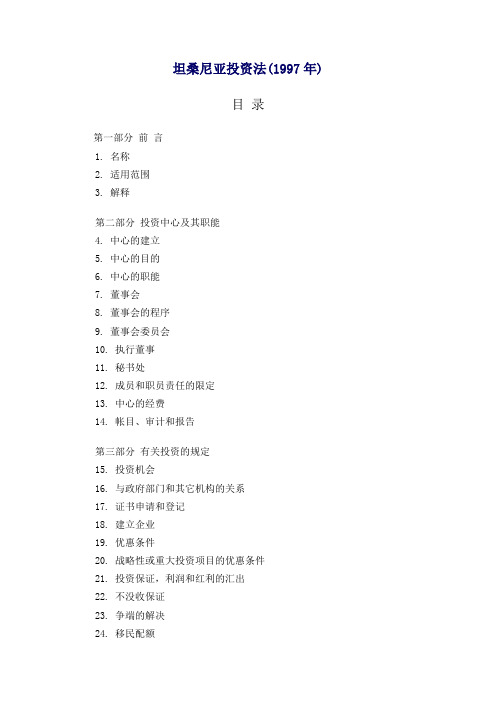
坦桑尼亚投资法(1997年)目录第一部分前言1. 名称2. 适用范围3. 解释第二部分投资中心及其职能4. 中心的建立5. 中心的目的6. 中心的职能7. 董事会8. 董事会的程序9. 董事会委员会10. 执行董事11. 秘书处12. 成员和职员责任的限定13. 中心的经费14. 帐目、审计和报告第三部分有关投资的规定15. 投资机会16. 与政府部门和其它机构的关系17. 证书申请和登记18. 建立企业19. 优惠条件20. 战略性或重大投资项目的优惠条件21. 投资保证,利润和红利的汇出22. 不没收保证23. 争端的解决24. 移民配额25. 外国投资者从国内获取信贷26. 技术转让协议第四部分一般规定27. 犯法和处罚28. 文件传送29. 规定30. 废除31. 过渡规定坦桑尼亚联合共和国1997年第26号法这是一部关于在坦桑尼亚进行投资,向投资者提供更优惠条件以及其它有关事务规定的法律。
第一部分前言1. 名称本法可称为《1997年坦桑尼亚投资法》,将由部长指定从政府公告上出版之日起生效。
2. 适用范围(1) 本条规定本法将适用于符合第(2)款规定的各种经营企业,除了:(a) 根据《1979年矿业法》批准从事物探、勘察或开采作业的经营企业或期望批准从事此类业务的企业;(b) 根据《1980年石油(勘探和生产)法》批准从事勘探、生产、建造和运营输油管道的经营企业或期望批准从事此类业务的企业;(c) 从事生产、经营或销售有害化学品、军火或各种爆炸物品的经营企业。
(2) 本条规定可以享受由本法提供优惠条件和保护的经营企业为:(a) 如为外国独资企业或合资企业,则最少投资资本将不少于相当30万美元(US$300,000)的坦桑尼亚先令;或(b) 如为本国投资企业,则最少投资资本将不少于相当10万美元(US$100,000)的坦桑尼亚先令。
(3) 尽管有第(1)款中(a)和(b)的规定,但第21条中有关资本、利润和红利汇出的保证和第22条中有关不没收财产的保证仍适用于根据《1979年矿业法》获得开采权证书或根据《1980年石油(勘探和生产)法》获得许可证书的任何经营企业,因为这些企业已被授予优惠条件证书并得到保护。
海外投资保险制度
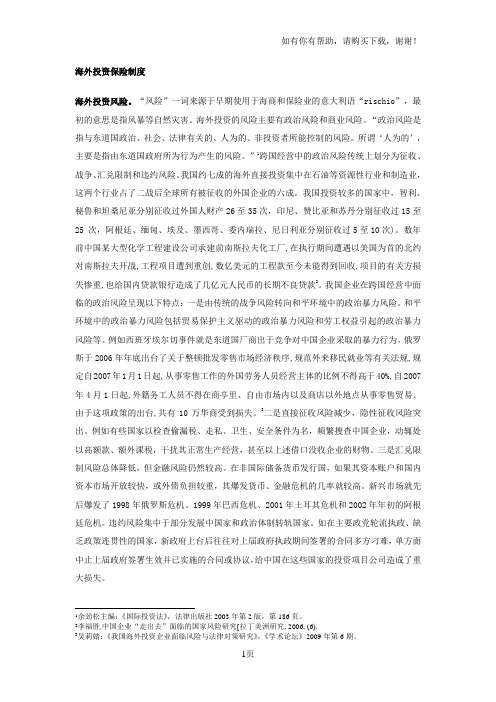
海外投资保险制度海外投资风险。
“风险”一词来源于早期使用于海商和保险业的意大利语“rischio”,最初的意思是指风暴等自然灾害。
海外投资的风险主要有政治风险和商业风险。
“政治风险是指与东道国政治、社会、法律有关的、人为的、非投资者所能控制的风险。
所谓‘人为的’,主要是指由东道国政府所为行为产生的风险。
”1跨国经营中的政治风险传统上划分为征收、战争、汇兑限制和违约风险。
我国约七成的海外直接投资集中在石油等资源性行业和制造业,这两个行业占了二战后全球所有被征收的外国企业的六成。
我国投资较多的国家中,智利、秘鲁和坦桑尼亚分别征收过外国人财产26至35次,印尼、赞比亚和苏丹分别征收过15至25 次,阿根廷、缅甸、埃及、墨西哥、委内瑞拉、尼日利亚分别征收过5至10次)。
数年前中国某大型化学工程建设公司承建前南斯拉夫化工厂,在执行期间遭遇以美国为首的北约对南斯拉夫开战,工程项目遭到重创,数亿美元的工程款至今未能得到回收,项目的有关方损失惨重,也给国内贷款银行造成了几亿元人民币的长期不良贷款2。
我国企业在跨国经营中面临的政治风险呈现以下特点:一是由传统的战争风险转向和平环境中的政治暴力风险。
和平环境中的政治暴力风险包括贸易保护主义驱动的政治暴力风险和劳工权益引起的政治暴力风险等。
例如西班牙埃尔切事件就是东道国厂商出于竞争对中国企业采取的暴力行为。
俄罗斯于2006年年底出台了关于整顿批发零售市场经济秩序,规范外来移民就业等有关法规,规定自2007年1月1日起,从事零售工作的外国劳务人员经营主体的比例不得高于40%,自2007年4月1日起,外籍务工人员不得在商亭里、自由市场内以及商店以外地点从事零售贸易。
由于这项政策的出台,共有10万华商受到损失。
3二是直接征收风险减少,隐性征收风险突出。
例如有些国家以检查偷漏税、走私、卫生、安全条件为名,频繁搜查中国企业,动辄处以高额款、额外课税,干扰其正常生产经营,甚至以上述借口没收企业的财物。
“一带一路”坦桑尼亚投资市场分析报告
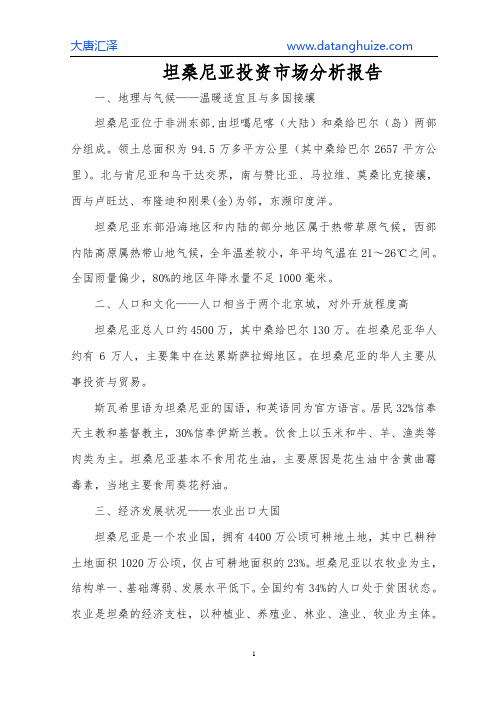
坦桑尼亚投资市场分析报告一、地理与气候——温暖适宜且与多国接壤坦桑尼亚位于非洲东部,由坦噶尼喀(大陆)和桑给巴尔(岛)两部分组成。
领土总面积为94.5万多平方公里(其中桑给巴尔2657平方公里)。
北与肯尼亚和乌干达交界,南与赞比亚、马拉维、莫桑比克接壤,西与卢旺达、布隆迪和刚果(金)为邻,东濒印度洋。
坦桑尼亚东部沿海地区和内陆的部分地区属于热带草原气候,西部内陆高原属热带山地气候,全年温差较小,年平均气温在21~26℃之间。
全国雨量偏少,80%的地区年降水量不足1000毫米。
二、人口和文化——人口相当于两个北京城,对外开放程度高坦桑尼亚总人口约4500万,其中桑给巴尔130万。
在坦桑尼亚华人约有6万人,主要集中在达累斯萨拉姆地区。
在坦桑尼亚的华人主要从事投资与贸易。
斯瓦希里语为坦桑尼亚的国语,和英语同为官方语言。
居民32%信奉天主教和基督教主,30%信奉伊斯兰教。
饮食上以玉米和牛、羊、渔类等肉类为主。
坦桑尼亚基本不食用花生油,主要原因是花生油中含黄曲霉毒素,当地主要食用葵花籽油。
三、经济发展状况——农业出口大国坦桑尼亚是一个农业国,拥有4400万公顷可耕地土地,其中已耕种土地面积1020万公顷,仅占可耕地面积的23%。
坦桑尼亚以农牧业为主,结构单一、基础薄弱、发展水平低下。
全国约有34%的人口处于贫困状态。
农业是坦桑的经济支柱,以种植业、养殖业、林业、渔业、牧业为主体。
坦桑政府高度重视发展农业,农业是坦桑吸引外资的最惠领域。
2013/14财年,农业产值约占GDP的比重为21.7%,农业人口占总人口80%。
农业生产技术不发达,水利和交通等基础设施较差。
80%的农民用锄头耕作,生产规模小,生产效率低。
近几年,农业年增长率约4.4%。
主要农作物有玉米、小麦、稻米、高粱、小米、木薯等。
粮食除自给自足外,还有少量的出口。
油料作物在坦桑尼亚属于非传统作物,主要包括工业用及油料作物,油料作物主要包括蓖麻、向日葵、花生、芝麻、椰子、棉籽和黄豆。
- 1、下载文档前请自行甄别文档内容的完整性,平台不提供额外的编辑、内容补充、找答案等附加服务。
- 2、"仅部分预览"的文档,不可在线预览部分如存在完整性等问题,可反馈申请退款(可完整预览的文档不适用该条件!)。
- 3、如文档侵犯您的权益,请联系客服反馈,我们会尽快为您处理(人工客服工作时间:9:00-18:30)。
坦桑尼亚投资法规整理坦桑尼亚劳工法注:一、根据现有资料无法找到《坦桑尼亚劳动管理法》,只有《桑给巴尔1990年(私有企业)雇佣条例》,其内容与《坦桑尼亚劳动管理法》基本一致。
二、本雇佣条例基本内容可作为《坦桑尼亚2002年工资规定及雇佣条例》的补充参考内容。
如内容发生冲突,以后者为准。
桑给巴尔1990年(私有企业)雇佣条例*第一章序言第一条本条例可以作为1990年(私有企业)雇佣条例引用。
并从部长签字之日起生效。
第二条适用范围1.本条例适用于当地的或外国的私有企业或机构的雇主和雇员。
2.本条例不影响外国人的就业合同。
第三条解释在本条例中,除非上下文另有要求,下列词语作如下解释:“局长”,指劳动局长。
“开业医生”,指经政府批准和业主认可的履行本条例可能需要或要求的任何开业医生。
“私有企业”,包括雇人从事家务或其他任何工作的私人个人。
第二章雇用第四条向劳动局申请1.任何想要雇人的人,均应请求劳动局允准。
2.本条第一款的申请,应提供细节,例如,要雇用的人数、资格、工种或寻求就业的人数等。
3.劳动局在确认将要被雇用的工人符合资格要求后,应签发许可证。
第五条书面合同1.每个雇员,无论是另时的或安日计酬的,在某个岗位上连续工作六个月以后,应转为长期的书面合同工。
2.每个准备长期受雇的雇员在受雇之前应签定书面合同。
第六条试用期1.已经签定了书面合同的雇员,应该接受为期不超过六个月的试用。
在满六个月以后,雇主应确认他为长期雇员。
2.本条例第34条规定的纪律惩罚条款,可以用于试用期的雇员。
3.处于试用期的雇员,在提前一个月得到通知或得到一个月的工资后,可以被辞退。
4.在超过六个月试用期以后,雇员不能被辞退,他应被认为是长期雇员。
第三章工作时间第七条工作时间1.工作时间应按下列规定安排:A.星期一至星期六(星期五除外)服务行业的工作时间不应超过7小时,工业部门不应超过8小时。
B.在星期五,无论服务行业或工业部门工作时间不应超过4.5小时,即上午7:30至中午12:00。
2.每周的工作时间,服务行业不应超过39.5小时;工业部门不应超过44.5小时。
3.雇主可以决定星期五以外每个工作日的上班及下班时间,星期五的工作时间按第1款B的规定安排。
4.雇主可安排雇员轮班工作,但每班的工作时间不应超过第一款A规定的时间。
5.星期日和法定的公共假日不应作为工作日。
6.尽管有第一款的规定,对于特殊职业,雇主可以根据工作特点,决定认为适合工作要求的雇员上下班时间、轮班和休息时间。
7.根据具体情况规定的每天工作时间和每周工作天数,不应超过本条例的规定。
8.下列工作属于特殊职业:警卫、社会服务如旅馆和医院、海员以及局长宣布的任何其他特殊职业。
第四章报酬第八条享有报酬权利每个雇员都享有在他同意的每隔一定时间和按本条例规定的条件获得报酬的权利。
第九条最低工资支付给雇员的最低工资,应符合劳动局的标准。
第十条劳动局长应在与JUWATA和桑给巴尔雇主协会磋商以后,批准并发布工资级别。
第十一条增加工资1.每个雇员都享有每年增加工资的权利。
2.在下列情况下,雇主可以不给雇员增加工资:A.雇员被证实不遵守纪律。
不遵守纪律是指:雇员有违纪行为,被检举证实。
B.雇员的工作表现不令人满意。
如果不给雇员增加工资,应该通知劳动局长并说明理由。
第十二条提高工资级别雇主可以在下列情况下提高雇员的工资级别:1.雇员的工作令人满意,可在原工资级别基础上提级。
2.如果雇主已经提升了雇员的职务。
第五章加班费第十三条加班费1.每个雇员如果工作超过正常工作时间,或正常工作时间之外加班,他有权获得加班费。
2.平日加班费不得低于下列标准:月工资X加班小时(或超过25分钟部分)X3--------------------------------------26X7X23.非工作日的加班费不得低于下列标准:月工资X加班小时X2--------------------26X7第六章假期第十四条年假每个雇员每年有权享有21个工作日的休假。
第十五条雇主可推迟年假如雇主认为必要,可推迟雇员的年假,但期限不得超过两年。
第十六条年假期间的外出雇员在其年假内可以到坦桑尼亚境内外的任何地方去。
第十七条雇主应付旅行费用由雇主批准的在坦桑尼亚境内的旅行,其费用应由雇主按以下标准支付:1.应支付雇员及其配偶、两个孩子或其赡养者不低于政府船票价的国内往返旅费。
2.A. MMB1到MMB2级的雇员有权乘三等舱。
上述级别的女雇员有权乘二等舱。
B. MMB3到MMB8级的雇员有权乘二等舱。
C. MMB9到MMB19级的雇员有权乘一等舱。
3.雇主可决定雇员所乘船只种类,但不得低于政府船运标准。
第十八条年假的开始到桑给巴尔或奔巴以外的地方度年假的雇员,如果他在离开的前一天还在工作,他的假期应从离开之日算起。
第十九条年假期间月薪支付1.雇主应向度假的雇员继续支付月薪。
2.若雇员提出申请,雇主可预支雇员月薪。
第二十条年假的中止1.未经雇员同意,不得中止起年假。
2.如果雇员休年假时被召回并同意继续工作,他有权保留其未休的假日,并在下个年假中或双方同意的其他任何时间休假。
第二十一条临时有薪休假1.如果雇主认为理由充足,雇员可以获得合理天数的临时有薪假期。
2.临时有薪休假应从年假中扣除。
应扣出在临时有薪假期中已经支付或给予的应在年假中给予的受益。
第二十二条病假1.雇员如果因长期患病不能工作,有权获得病假。
2.病假应由开业医生或其授权代行其职的人审批。
3.短期病假不得超过60天,并应是有薪休假。
除非第二十三条规定的增加期限不被视为短期病假的组成部分。
4.短期病假不影响正常年假。
第二十三条短期病假超期时间由开业医生批准的短期病假期满之后,如果雇主和开业医生认为有必要让依照本条例第二十二条获得短期病假的雇员继续休假,开业医生可再批准不超过60天的带全薪的病假,但这60天应从雇员的年假中扣除。
第二十四条长期病假及以医疗为理由的解雇1.开业医生可批准依本条例第二十二条及第二十三条获短期病假而未痊愈的雇员不超过90天的长期病假。
在此期间:A.此雇员享有半薪。
B.上述期限的三分之二应从年薪中扣除。
2.上述期限期满以后,如果雇员仍未康复,开业医生可以批准不超过90天的不带工资的病假。
3.不带工资的病假的病假期满后,如果雇员仍未康复,他无权再获得任何续假,开业医生应以医疗为理由批准解雇该雇员。
第二十五条产假1.应给予已生小孩的女雇员有薪产假。
2.产假为3个月,3年一次。
3.产假应从分娩的当日算起。
4.产假不影响年假。
第二十六条不带工资的假期在下列下列情况下,雇主可批准并给予任何雇员不带工资的假期:1.如果女雇员在上述第二十五条规定的3年间隔期内生小孩。
2.如果雇员按上述第二十四条规定正在休长期病假。
3.如果雇员不得不照料生病的配偶、孩子或他赡养的任何其他人,但要有充足的理由说明他不得不这样做。
4.如果雇员要去陪伴因休假或调动而外出的配偶。
5.女雇员新丧夫闭门不出。
6.雇员因参加任何对国家有益的活动,但是此活动是否对国家有益应完全由雇主决定。
7.因雇主认为需要的任何其他理由。
第二十七条强制性不带工资的假期1.在下列情况下,雇主可给予雇员群体不超过6个月的强制性不带工资的假期:A.因缺乏原材料、工厂停产、工厂毁于火灾或其他内在或自然灾害引起的工人超员。
B.如果因为A款描述的情况或任何其他充足的理由,企业继续维持现有工人人数很可能倒闭。
2.如果情况需要强制性不带工资的休假,必须由局长批准。
3.在6个月期满以后,雇主应该决定:A.为强制性不带工资的休假的雇员恢复工作。
B.根据本条例第三十条的规定终止雇用。
第七章服务的终止第二十八条合同终止后的解雇1.任何雇员都可以在其服务期限终止之日被解雇。
2.根据本法第三十条规定,雇主应向雇员支付终止津贴。
第二十九条终止通知1.如果服务合同没有规定终止日期,或者虽规定了终止日期,但雇主想要在终止日期期满之前终止雇用,或服务合同在某个时期以后延期,或雇主根据公众利益想要终止雇用,那么,雇主应在终止日期前两个月通知雇员,或支付雇员两个月工资来代替通知。
如果根据公众利益要终止雇用,这种终止应得到局长的书面批准才能成立。
2.在本条第一款的情况下,雇员如果想要终止其服务,应在终止前两个月通知雇主,或退还雇主两个月的工资代替通知。
第三十条终止津贴1.根据本条例的任何规定被终止雇用的雇员,有权享有根据雇用合同规定的期限计算的退职金和其他终止津贴。
雇员因违犯本条例或被非法解雇,无论何种情况都没有恢复工作,他都被认为是适当地解雇,且有权享受所有的解雇津贴和其他应收款。
2.付给雇员的退职金应为终止雇用时一个半月工资乘以服务年限。
第三十一条终止津贴的丧失除非本条例另有明确规定,如果雇员因违犯他的雇用条例或本条例的规定而终止其服务,他将无权享有任何终止津贴。
第八章暂时停职、解雇和违犯纪律第三十二条暂时停职1.如果雇员被指称有任何犯罪行为,雇主如果认为必要,可以暂停该雇员在被调查和法庭处理其案件期间的工作。
2.如果被指认的犯罪行为发生在工作场所,雇主应在暂停其工作之前向警方报告案情。
3.雇主应给按照本条例暂时停职的雇员支付六个月的半份工资。
本期限到期后,如果还未定案,则劳动局长、工会和雇主协会应联合决定对该雇员的处理。
第三十三条宣判有罪和无罪的处理1.如果雇员被宣判有罪并被判处有期徒刑三个月或三个月以上,雇主可以解雇该雇员。
2.如果雇员被宣判有罪并被判处有期徒刑少于三个月、罚款、缓刑或其他刑罚,雇主应给他恢复工作。
如果他无权享有停止工作期间被扣留的这笔钱(半份工资),而且他被判处少于三个月的徒刑,他就无权从判决之日起的半份工资,他服刑的这段时间将被视为停薪留职。
3.如果对雇员的指控案被驳回,雇主应给他恢复工作,并支付其停止工作期间被扣留的这笔钱。
4.如果雇员被审判法庭判为有罪,判刑为三个月或三个月以上,且被雇主解雇,但雇主提出诉讼,要求取消审判法庭的决定,若受理上诉的法庭释放了该雇员或予以减刑,这种刑罚仍然有效,因为它是审判法庭的裁决,应给雇员以适当的处罚或伸冤。
5.雇员服刑期间应被视为停薪留职。
第三十四条违犯纪律1.应根据本条例所附细则的规定施行违纪处罚。
2.任何为了维持生计而发生的违纪行为,如果在六个月之内没有其他违纪行为,则应在六个月期满之后不予追究。
第九章未尽事宜第三十五条服装、工作服和劳保服每个雇主都应给雇员提供其工作期间为了清洁卫生、健康和安全必需的工作服、劳保服和器材,其标准不应低于本条例所附细则的规定,或者,该标准由劳动局长审定。
第三十六条雇主违约不损害雇员的权利如果雇主不能使其经营活动或企业达到合法或有效的要求,除非雇员知道、支持、或暗中参与这种违约,雇员获得任何权益的权利,不因雇主的经营活动或企业的这种违约或非法性而受损害;如果目的是为了增加雇员的这种权益,那么该企业和经营活动应视为合法。
